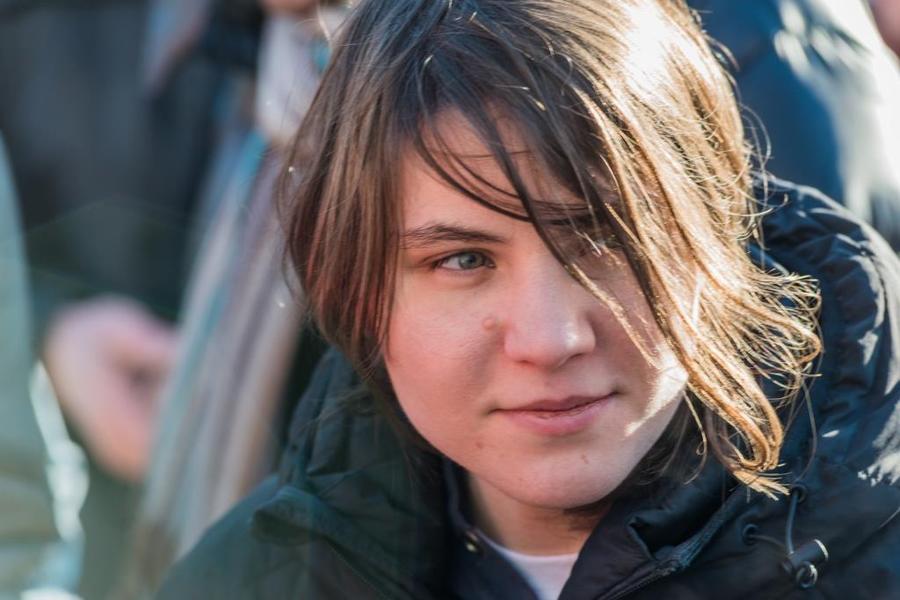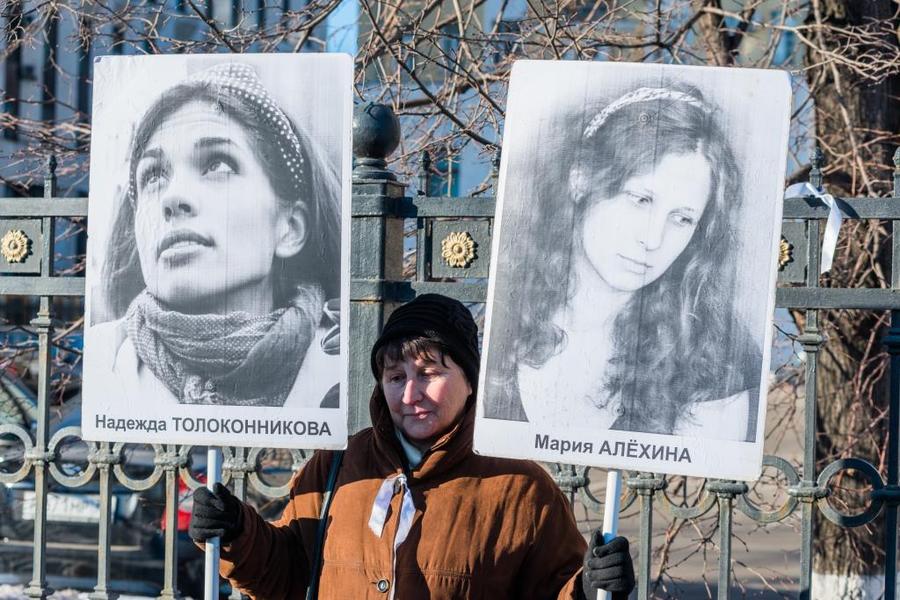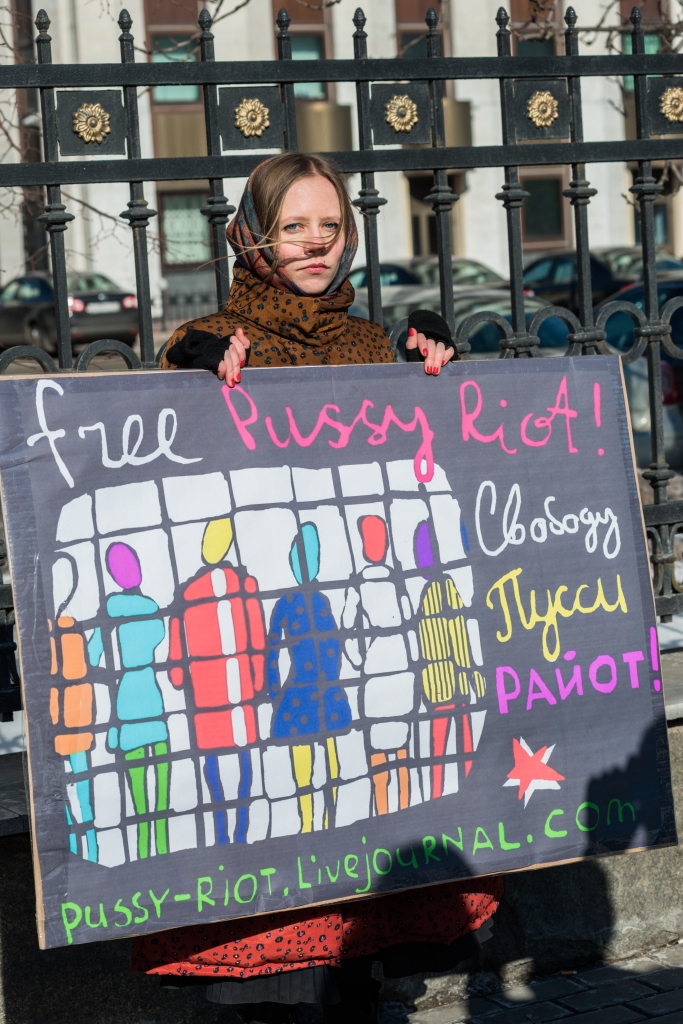Down with the Prison, Freedom to Protest – Sylwia Chutnik talks with Yekaterina Samutsevich about Pussy Riot and her artistic inspirations
Sylwia Chutnik talks with Yekaterina Samutsevich about Pussy Riot and her artistic inspirations
Yekaterina Samutsevich (b. 1982) – Russian artist and social activist. Member of Pussy Riot. On 21 February 2012, together with Nadezhda Tolokonnikova and Maria Alyokhina, she performed the song Virgin Mary, Redeem Us of Putin! at the Moscow Cathedral of Christ the Saviour, wearing colourful balaclavas. The song criticised the devotion and support extended to Putin by the hierarchs of the Russian Orthodox Church. On 17 August 2012, the court sentenced Pussy Riot members to two years in a penal colony for hooliganism motivated by religious hatred and performing a protest song at an orthodox cathedral. In October 2012, Samutsevich was released on two years probation.
SYLWIA CHUTNIK: What is your current legal status? You are the only Pussy Riot member to have been released, but this is obviously not the end of your problems with the justice system.
YEKATERINA SAMUTSEVICH: I got a suspended sentence. I was judged guilty of violating the Article 213 paragraph 2 (group-based, planned disorderly conduct motivated by a lack of respect towards society, connected with expressing opposition to the authorities or other bodies charged with preserving public order), like Nadya and Masha[1], but the court decided to change the preventative measures in my case, on certain conditions. The suspended sentence prevents me from travelling country unmolested and forbids me to leave Russia. I also may not commit even the slightest offence, such as crossing the street in a wrong place, because they could extend my probation period or, if they so fancy, lock me up in prison once again. There have been instances like that. It is not the end, because all of us are waiting for court acquittals. We hope that it will happen as soon as possible, so that Nadya and Masha are free before March 2014. Meanwhile, we need to grapple with our justice system.
Are you in touch with other Pussy Riot members?
With Masha and Nadya, not so much. Actually, I can’t really contact them, because like them I was judged guilty and, according to the court sentence, I was their partner in crime. I do try to send them letters, posing as someone else, but they are not able to write honest answers – all letters are read by prison censors. Meanwhile, I meet regularly with other members, we discuss current problems and artistic plans. None of us has left Russia, so everyone is here.
How did you become a part of the band? Did you join because of art, music or political reasons?
I took my first steps in Pussy Riot right when the group was born. There were many reasons, but for me as an artist, the most important thing was to be able to create left-wing feminist art in Russia. Obviously, just as the rest of our group, I also protest against Russia’s current political situation and against the spreading sexism and homophobia. In other words, I am motivated by both political and artistic reasons.
If you were to say something about Pussy Riot in the context of freedom, would you speak about human rights or creative expression?
Although freedom has many aspects, it is inseparable from human rights, otherwise it would be a completely abstract notion, easily manipulated as permission to do anything. I am not a lawyer and I don’t know the legal definition of freedom, but I interpret it as a balance of the liberties of all people. This is why freedom of speech and beliefs also includes the notion of a balance of rights of all people to express their opinion. Both artists and all other people have a right to create their own form of expression, based on their traditions and history of art. If society has no adequate knowledge to understand the language of art, one that is used by our group, this lack of understanding may degenerate into the violation of the artistic freedom of speech, which is what happened to us.
What are your artistic inspirations? Are you inspired by anything or anyone in Russia? Does the contemporary art in Russia participate in the democratic process or does it prefer to steer clear of politics?
As any other person, I turn to many sources for inspiration. I am inspired by other artists’ work, by film directors, musicians, life itself. Russia’s contemporary art used to be very political until recently. The situation started to change after our trial. Artists were forced to take a step back from the dangerous system in order not to be destroyed. Actually, the situation of contemporary art in Russia had deteriorated already in 2000.
What was your favourite and in your opinion the most successful action organised by Pussy Riot? Could you describe it?
I don’t like dividing our performances into ones I liked and ones I didn’t like. I can only talk about successful events and ones that went wrong because of obstacles that are only natural to every illegal punk performance played by women in colourful balaclavas. To me, the Kropotkin Vodka was the greatest hit, because both the performance and the video clip that was shot were successful. We protested against the glamour culture, which is very pro-government in Russia, because only the extremely wealthy people from the circles of power can afford such a grand, glamour lifestyle. We performed in boutiques, at fashion shows, where we even managed to set fire to the stage and ourselves, at the glass advertising packaging of a car, at the roof of the Semachev bar, which, incidentally, is flourishing and has grown by several floors.
Colourful tights, balaclavas, girl power music: do you identify with the Riot Grrrl style?
Yes, of course we really enjoy this movement, it inspires us. It is an astonishing cultural phenomenon that shut up many male groups and proved false all the stereotypes that said that women could not play true punk and that separatism was just some insecure women fooling around. We decided that we didn’t have to perform in clubs. We wanted to be open towards society and play in places where people usually don’t listen to feminist punk. It was only after seeing our video clips that many people heard about the Riot Grrrl movement and about feminism itself, so sometimes breaking the law may turn out to be good to society.
What is the role of men in your band?
None, there are no men in the band. We stick to the separatist strategy in art. We are against accepting men into our group. Access denied.
Are there any books or articles that you would say were crucial to your growth? That contributed to you becoming the person that you are now?
There were many, from Lem and his Summa Technologiae, to Michel Foucault and Discipline and Punish. Of course I was also influenced by feminist authors – from Judith Butler to Juliet Mitchell.
What are your current artistic pursuits?
Because of my problems with courts, I don’t have much time for art. I am doing my best to end this conflict with the law and be able to devote myself entirely to artistic activity.
Translated from Russian to Polish by Paweł Brzuzy
[1] Nadezhda Tolokonnikova and Maria Alyokhina, members of Pussy Riot.
-
 Yekaterina Samutsevich, a picket line in favour of freeing other Pussy Riot members, 8.3.2013, Moscow © elvistudio / Shutterstock.com
Yekaterina Samutsevich, a picket line in favour of freeing other Pussy Riot members, 8.3.2013, Moscow © elvistudio / Shutterstock.com
-
 A picket line in favour of freeing Nadezhda Tolokonnikova and Maria Alyokhina, 8.3.2013, Moscow © elvistudio / Shutterstock.com
A picket line in favour of freeing Nadezhda Tolokonnikova and Maria Alyokhina, 8.3.2013, Moscow © elvistudio / Shutterstock.com
-
 A picket line in favour of freeing Nadezhda Tolokonnikova and Maria Alyokhina, 8.3.2013, Moscow © elvistudio / Shutterstock.com
A picket line in favour of freeing Nadezhda Tolokonnikova and Maria Alyokhina, 8.3.2013, Moscow © elvistudio / Shutterstock.com
-
 A picket line in favour of freeing Nadezhda Tolokonnikova and Maria Alyokhina, 8.3.2013, Moscow © elvistudio / Shutterstock.com
A picket line in favour of freeing Nadezhda Tolokonnikova and Maria Alyokhina, 8.3.2013, Moscow © elvistudio / Shutterstock.com